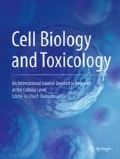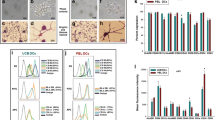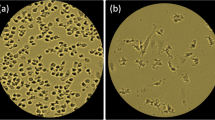Abstract
A toxic injury such as a decrease in the number of immature dendritic cells caused by a cytotoxic effect or a disturbance in their maturation process can be responsible for immunodepression. There is a need to improve in vitro assays on human dendritic cells used to detect and evaluate adverse effects of xenobiotics. Two aspects were explored in this work: cytotoxic effects of xenobiotics on immature dendritic cells, and the interference of xenobiotics with dendritic cell maturation. Dendritic cells of two different origins were tested. Dendritic cells obtained either from umbilical cord blood CD34+ cells or, for the first time, from umbilical cord blood monocytes. The cytotoxicity assay on immature dendritic cells has been improved. For the study of the potential adverse effects of xenobiotics on the maturation process of dendritic cells, several parameters were selected such as expression of markers (CD86, CD83, HLA-DR), secretion of interleukins 10 and 12, and proliferation of autologous lymphocytes. The relevance and the efficiency of the protocol applied were tested using two mycotoxins, T-2 toxin and deoxynivalence, DON, which are known to be immunosuppressive, and one phycotoxin, domoic acid, which is known not to have any immunotoxic effect. Assays using umbilical cord monocyte dendritic cell cultures with the protocol defined in this work, which involves a cytotoxicity study followed by evaluation of several markers of adverse effects on the dendritic cell maturation process, revealed their usefulness for investigating xenobiotic immunotoxicity toward immune primary reactions.
Similar content being viewed by others
Abbreviations
- DC:
-
dendritic cell
- DON:
-
deoxynivalenol
- FBS:
-
fetal bovine serum
- FITC:
-
isothiocya-nate
- GM-CSF:
-
granulocyte-macrophage colony-stimulating factor
- M-DC:
-
monocyte-derived dendritic cells
- PBS:
-
phosphate-buffered saline
- PE:
-
phycoerythrin
References
Caux C, Saeland S, Favre C, Duvert V, Mannomi P, Banchereau J. TNF-uα strongly potentiates interleukin-3 and GM-CSF induced proliferation of human CD34 hematopoietic progenitor cell. Blood. 1990;75:2292–8.
Caux C, Dezutter-Dambuyant C, Schmitt D, Banchereau J. GM-CSF and TNF-uα cooperate in the generation of dendritic Langerhans cells. Nature. 1992;360:258–61.
Clark GJ, Angel N, Kato M, et al. The role of dendritic cells in the innate immune system. Microbes Infect. 2000;2:257–72.
Coutant KD, De Brugerolle De Fraissinette A, Cordier A, Ulrich P. Modulation of the activity of human monocyte-derived dendritic cells by chemical haptens, a metal allergen and a staphylococcal superantigene. Toxicol Sci. 1998;52:189–98.
Froquet R, Sibiril Y, Parent-Massin D. Improvement of megakaryocytic progenitor culture for toxicological investigations.Toxicol In Vitro. 2001;15:691–9.
Froquet R, Arnold F, Batina P, Parent-Massin D. Do trichothecenes reduce viability of circulating blood cells and modify haemostasis parameters? Mycopathologia. 2003;156:349–56.
Laupeze B, Amiot L, Sparfel L, Le Ferrec E, Fauchet R, Fardel O. Polycyclic aromatic hydrocarbons affect functional differentiation and maturation of human monocyte-derived dendritic cells. J Immunol. 2002;168:2652–8.
Lautraite S, Parent-Massin D, Rio B, Hoellinger H. Comparison of toxicity induced by T-2 toxin on human and rat granulo-monocytic progenitors with an in vitro model. Hum Exp Toxicol. 1995;14: 672–8.
Lautraite S, Parent-Massin D, Rio B, Hoellinger H. In vitro toxicity induced by deoxynivalenol (DON) on human and rat granulo-monocytic progenitors. Cell Biol Toxicol. 1997;13: 175–83.
Parent-Massin D. Haematotoxicity of trichothecenes. Toxicol Lett. 2004;153:75–81.
Pestka J, Zhou HR, Moon Y, Chung YJ. Cellular and molecular mechanisms for immune modulation by deoxynivalenol and other trichothecenes: unraveling a paradox. Toxicol lett. 2004;153:61–73.
Rio B, Lautraite S, Parent-Massin D. In vitro toxicity of trichothecenes on human erythroblastic progenitors. Hum Exp Toxicol. 1997;16:673–9.
Rio B, Froquet R, Sibiril Y, Parent-Massin D. Relevance of erythroblast progenitor clonogenic assays in toxicological studies. ATLA. 1999;27:363. [Abstract].
Romani N, Gruner S, Brang D, et al. Proliferating dendritic cell progenitors in human blood. J Exp Med. 1994;180:83–93.
Romani N, Reider D, Heuer M, et al. Generation of mature dendritic cells from human blood. An improved method with special regard to clinical applicability. J Immunol Methods. 1996;196:137–51.
Sallusto F, Lanzavecchia A. Efficient presentation of soluble antigen by cultured human dendritic cells is maintained by granulocyte/macrophage colony-stimulating factor plus interleukin 4 and downregulated by tumor necrosis factor alpha. J Exp Med. 1994;179:1109–18.
Steinman RM. The dendritic cell system and its role in immunogenecity. Annu Rev Immunol. 1991;9: 271–96.
Verhasselt V, Buelens C, Willems F, De Groote D, Haeffner-Cavaillon N, Goldman M. Bacterial lipopolysaccharide stimulates the production of cytokines and the expression of costimulatory molecules by human peripheral blood dendritic cells: evidence for a CD14-dependent pathway. J Immunol. 1997;158:2919–25.
Whittle K, Gallacher S. Marine toxins. Br Med Bul. 2000;56:236–53.
Zhou LJ, Tedder, T.F. Human blood dendritic cells selectively express CD83, a member of the immunoglobulin superfamily. J Immunol. 1995;154:3821–35.
Author information
Authors and Affiliations
Corresponding author
Rights and permissions
About this article
Cite this article
Hymery, N., Sibiril, Y. & Parent-Massin, D. Improvement of human dendritic cell culture for immunotoxicological investigations. Cell Biol Toxicol 22, 243–255 (2006). https://doi.org/10.1007/s10565-006-0180-3
Received:
Accepted:
Published:
Issue Date:
DOI: https://doi.org/10.1007/s10565-006-0180-3




